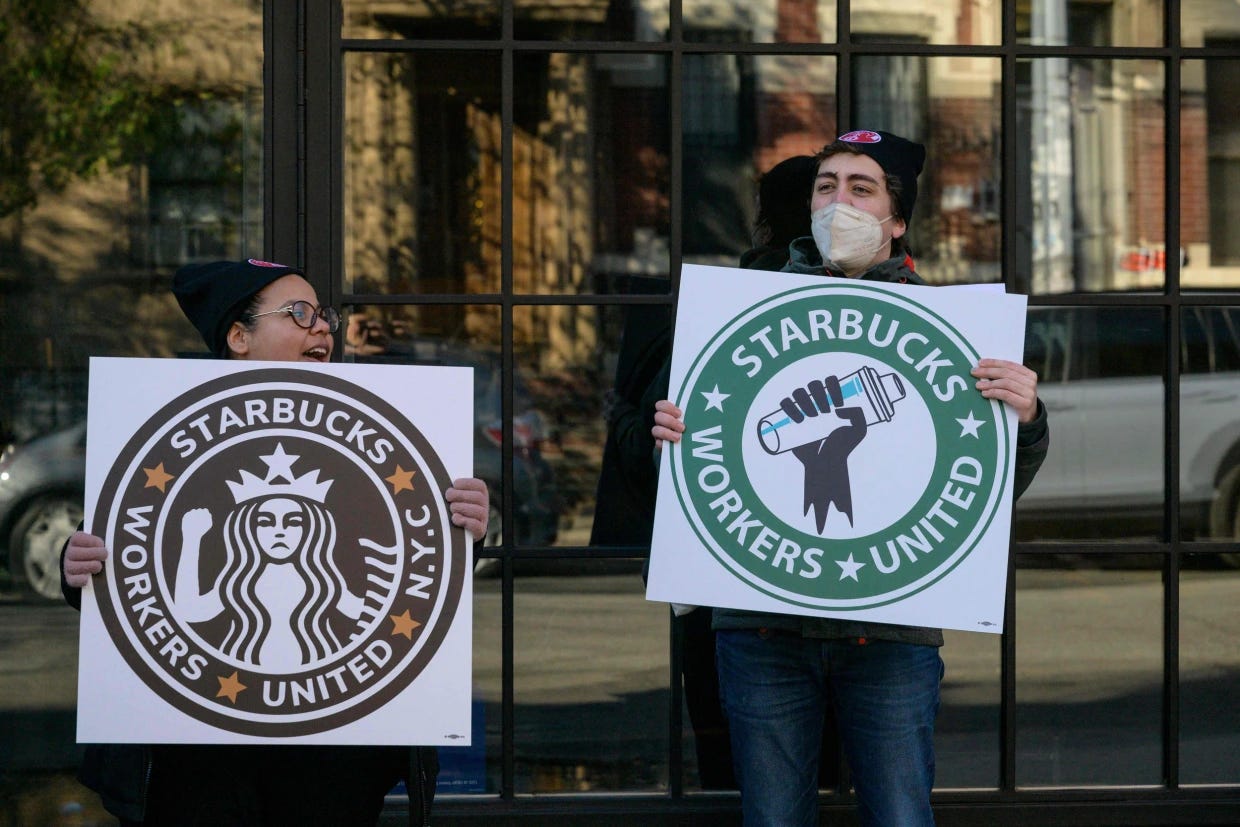10/21/2024: ALJ Hits Starbucks With Cemex Bargaining Order
New bargaining order standard gets another application.
Starbucks Corporation, JD(NY)-14-24, 29-CA-292741 (ALJ Decision)
The Union, Workers United (affiliated with SEIU), sought to represent employees at Starbucks' Great Neck, NY, store. After filing the RC petition on February 10, 2022, several charges were brought against Starbucks for violations of the National Labor Relations Act (NLRA) under Sections 8(a)(1) and 8(a)(3), including threats, coercion, and retaliation against employees for their union activities. The ALJ, Jeffrey P. Gardner, presided over a trial, heard testimonies, and evaluated the evidence, ultimately concluding that Starbucks had engaged in multiple violations of the NLRA, warranting serious remedies.
Legal Issues:
Violations of Section 8(a)(1):
Threats and Coercion: Starbucks managers made direct and implied threats to employees about losing benefits, including promotions and health coverage, if the Union was voted in. For instance, a district manager told employees that if the Union succeeded, the company would stop being lenient regarding shift transfers, promotions would be impacted, and certain benefits would be withdrawn.
Solicitation of Grievances: Starbucks solicited grievances from employees with implied promises of remedying those grievances, a tactic meant to discourage union support. The ALJ found this unlawful as it undermined the Union's role and made union representation seem unnecessary.
Interrogation and Impression of Surveillance: Management's repeated questioning of employees about their union activities and their interactions with other employees regarding the Union were found to be coercive and amounted to unlawful interrogation. Additionally, Starbucks created the impression of surveillance by monitoring employees' union activities.
Violations of Section 8(a)(3):
Retaliatory Reduction of Hours: The General Counsel argued that Starbucks retaliated by reducing employees' work hours after the Union campaign began. While there was some evidence of reduced hours, the ALJ found that the reductions were mainly attributed to personal time-off requests by employees.
Unilateral Changes: Starbucks changed workplace policies, including restrictions on posting union materials on bulletin boards, stricter enforcement of free food benefits, and the refusal to approve shift swaps, all of which were deemed retaliatory and unlawful.
Bargaining Order: Given the widespread nature of Starbucks' unlawful conduct, the ALJ concluded that setting aside the results of the election was necessary, and a bargaining order was issued, requiring Starbucks to recognize and bargain with the Union. This was based on the principles set forth in NLRB v. Gissel Packing Co., and the new standard articulated in Cemex Construction Materials Pacific, LLC.
Remedies:
Starbucks was ordered to cease and desist from further violations of Sections 8(a)(1) and 8(a)(3), including threats, solicitation of grievances, and interrogation.
A bargaining order was issued requiring Starbucks to recognize and negotiate with Workers United as the exclusive bargaining representative.
Starbucks was required to post a notice informing employees of their rights and the company's obligations under the Act.
Significant Cases Cited:
NLRB v. Gissel Packing Co., 395 U.S. 575 (1969): This Supreme Court case provides the framework for issuing bargaining orders when an employer's unlawful conduct undermines union support to the extent that a fair election is not possible. Here, the ALJ used this case to justify the bargaining order.
Cemex Construction Materials Pacific, LLC, 372 NLRB No. 130 (2023): This NLRB case revised the standard for issuing bargaining orders and required that employers recognize unions if a majority of employees support the union unless they file an RM (representation) petition. The ALJ applied the Cemex standard in determining that Starbucks' unlawful conduct warranted a bargaining order.
Smithers Tire, 308 NLRB 72 (1992): Cited in the analysis of unlawful threats, the case established that threats of benefit loss due to union activity violate Section 8(a)(1), regardless of the intent or effect on the listener.
Tesla, Inc., 370 NLRB No. 101 (2021): This case was referenced concerning the solicitation of grievances, reinforcing that employers may not use grievance solicitation during a union drive to undermine support for union representation.
Rossmore House, 269 NLRB 1176 (1984): This case provided the legal framework for assessing coercive questioning under the totality of the circumstances, supporting the ALJ's finding that Starbucks unlawfully interrogated employees about their union activities.



